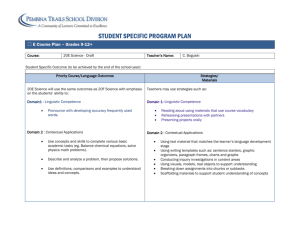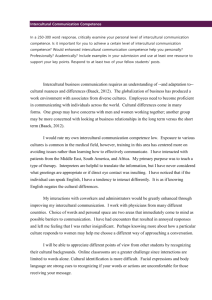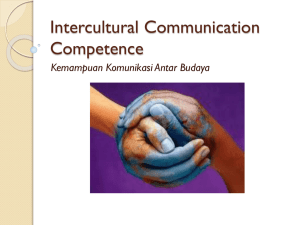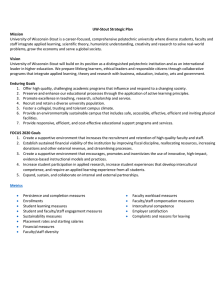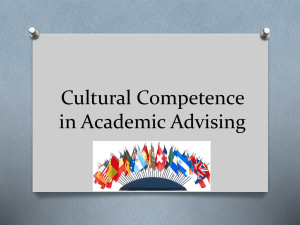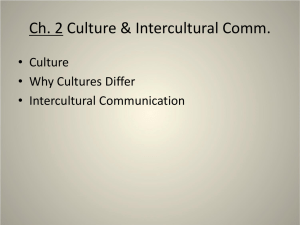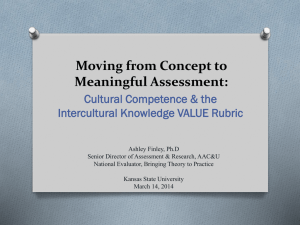Achieving Understanding in Intercultural Interaction: An Intercultural Competence Perspective
advertisement
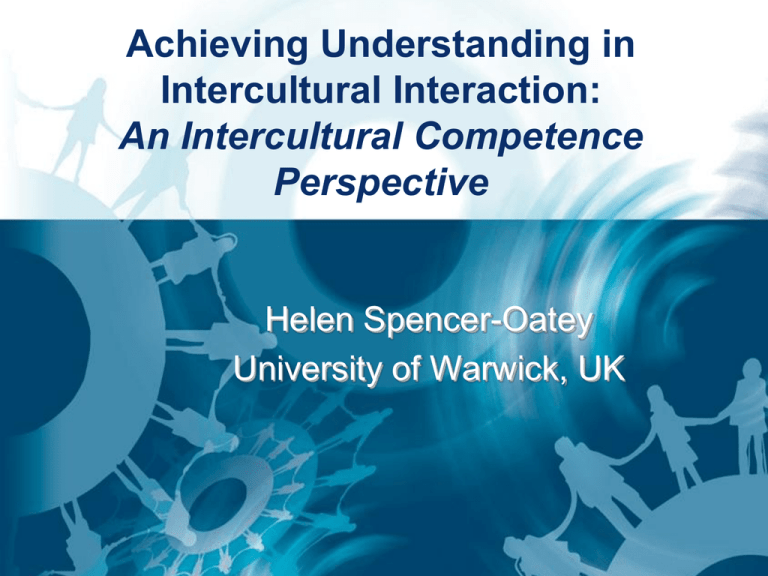
Achieving Understanding in Intercultural Interaction: An Intercultural Competence Perspective Helen Spencer-Oatey University of Warwick, UK Overview Overview • • • • • Introduction: why intercultural competence? Case study: the eChina-UK Programme Conceptualising Intercultural Competence Global People Project Further Developments Introduction: Why IC Competence? 1. Developing IC Competence Developing „global people‟ is more challenging than setting up a global business or global partnership, yet is vital. 2. Impact of a focus on Task A focus on task can distract us from attending to intercultural aspects 2. Impact of a focus on Task Key Aims of the eChina-UK Programme 1. Strengthen collaboration between China and the UK in the use of ICT, and support HE staff in developing their competence in the use of internet-based learning and teaching; 2. Develop & pilot innovative online teacher training courses for teachers at secondary and tertiary levels; 3. Disseminate generic insights on a range of issues, including perspectives on pedagogy and the benefits & challenges of working interculturally; 4. Inform the development of national policy on e-learning in HE in both countries. 2. Impact of a focus on Task Key Aims of the eChina-UK Programme 1. Strengthen collaboration between China and the UK in the use of ICT, and support HE staff in developing their competence in the use of internet-based learning and teaching; 2. Develop & pilot innovative online teacher training courses for teachers at secondary and tertiary levels; 3. Disseminate generic insights on a range of issues, including perspectives on pedagogy and the benefits & challenges of working interculturally; 4. Inform the development of national policy on e-learning in HE in both countries. 3. Beliefs about Culture Recent claims: “Professional cultures are global and transcend national differences.” “The idea of there being a need to adapt to Chinese culture can be a barrier to successful discussions.” Peter Brady, Times Higher Education 22 January 2009 3. Beliefs about Culture How do we perceive cultural differences? Minimise Exaggerate • Excessive minimisation or exaggeration both unhelpful Does this matter? Case Study: The eChina-UK Programme eChina-UK Programme • • • • Set of Sino-British collaborative projects on eLearning in education Funded by the Higher Education Funding Council for England (HEFCE) (£4 million) & supported by Chinese Ministry of Education Involved British and Chinese universities working in partnership 4 initial projects, 3 follow-up projects, with each project having core team of about 16 to 35 Key Parties in the Programme Stakeholder/ Management U of Nottingham Lead Universities Team Members Trainees MoE HEFCE WUN Senior Management BNU Open/ Cambridge Academics BFSU Tsinghua U Technical Staff Management Chinese 23: “Great differences exist between the working mechanisms in China and in the West. … Our working procedures, overall circumstances, thinking style and decision-making processes etc. are not all the same.” Communication: Language English or Chinese? Chinese 16: “I think we should show consideration for each other in terms of language. China is now developing very fast; they should know some Chinese to communicate with us. … We have learned a lot of English; it‟s their turn to learn some basic Chinese, as it‟s two-way communication. I find it 他们应该 weird that they don‟t know even a word of 懂中文 Chinese.” Communication: Language Chinese or English? Chinese 21: The working language was English. Due to the language problems, when we couldn‟t express ourselves clearly, it seemed that we were disadvantaged. Communication: Language Use Meaning needs to be negotiated British 09: When I first joined, I spent weeks if not months on a simply practical confusion as to what is a unit, a module, what was the other one? British 06: Activity British 09: There was no standard definition, so I was like blocked at the first hurdle, and so I wasn‟t quite sure how much material I‟d got to write … I thought I don‟t understand this, I can‟t do this. Communication: Management Management of Channels of Communication Chinese Researcher: In your opinion, was the communication effective? Chinese 20: No, it wasn‟t. Though both Chinese and British sides had their own project managers, they couldn‟t do all the communications on their own. We should have embedded different communication mechanisms in the project at different levels. Communication: Management Attention to Communication Protocols Chinese 06: The UK colleagues are more likely to raise issues directly. Their logic is that issues should be raised first, then they‟ll try their best to find solutions. … Sometimes the UK project manager sent some suggestions to us. When we got the suggestion, we usually got nervous and wondered „must we do it immediately?‟ or „are they commanding us to do this?‟ But working together with them for a while I gradually realised that I could voice my opinions too and take time to think. It wasn‟t a problem. Relationships Attention to Relationships British 06: Whilst it is recognised that building social relationships serves to strengthen developing working relationships, it should likewise be acknowledged that this relies heavily on the willingness of team members to give of their free time, outside the boundaries of any given project. The value of this „voluntary‟ input outside formal working time should not be underestimated, nor remain unacknowledged. There is a social dimension to effective team building that should ideally be built into the project. Personal Qualities Need for Self-Awareness Brit 17: Can we step back a bit because we‟re getting a bit detailed? Brit 18: Am I losing you? Ch 20: Well to me it‟s a bit too detailed, can you give me an overall picture? Need for IC Competence • • • • Research indicates we could all have benefited from better preparation in: Managing across cultures Communicating across cultures Building relationships across cultures Developing qualities for working across cultures Conceptualising Intercultural Competence IC Competence: Definitions We conceive of intercultural communication competence as „the ability to effectively and appropriately execute communication behaviors to elicit a desired response in a specific environment.‟ Chen & Starosta 1998: 241-2 Intercultural communication competence is the effective identity negotiation process between two interactants in a novel communication situation. Ting-Toomey 1992: 73; cited by Gudykunst et al. 2005: 18 IC Competence: Frameworks See handout. Gudykunst (1998): • Generalised comments (see quote on handout) • No discourse examples Byram (1997): • Provides detailed information on objectives relating to intercultural competence • No discourse examples Global People Project Global People: Background • • • • Global People Project forms Phase 3 of HEFCE‟s £4M eChina-UK Programme Phases 1 & 2: British & Chinese universities worked collaboratively on range of eLearning in education projects Phase 1: 2003-2005 Phase 2: 2005-2007. Global People: Background Two of HEFCE’s Key Goals for the eChina-UK Programme: • Strengthen collaboration between China and the UK • Disseminate generic insights on a range of issues, including the benefits & challenges of working interculturally Global People: Background Phase 3 (Global People): 2008–2009 Key Aims: • Draw out learning from the eChina-UK Programme on working interculturally • Identify generic frameworks and models (i.e. not country specific) • Develop resources that are of practical value to those working in international projects (especially in HE) Global People: Background Phase 3 (Global People): 2008–2009 Procedure: • Review the literature on intercultural competence and on working across cultures • Analyse data from the eChina-UK Programme & Projects from an intercultural perspective • Collect new interview data from eChinaUK project members Frameworks & Models http://www.globalpeople.org.uk/ • • • Life cycle model of intercultural partnerships Learning process model Competency framework The Competency Framework • Intercultural collaborations are a delicate balancing acts • Our Competency Framework was developed to help raise awareness of competencies that facilitate intercultural work The Competency Framework • Identifies four competency clusters – – – – Knowledge and Ideas Communication Relationships Personal Qualities and Dispositions • Explains each competency and discusses why it is important for intercultural effectiveness • Illustrates each competency with a case study example from the eChina-UK Programme (some of them supported by audio clips) Sample data Introductory meeting during an exchange visit Purpose: to discuss research interests and potential for collaboration. Communication Competency Cluster • • • • • • Communication management Language learning Language adjustment Active listening Attuning Building of shared knowledge & mutual trust • Stylistic flexibility Further Developments Further Developments Plans (subject to funding) • Further analysis – more detailed analyses of our video data. • Further research (e.g. with different countries, different types of projects, different types of partnerships) Thank you
